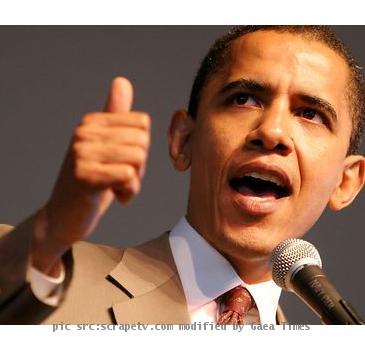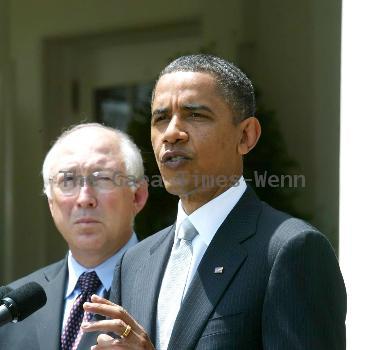Crisis looms over Israeli settlement construction, just days after Mideast talks are launched
By Mohammed Daraghmeh, APSunday, September 5, 2010
Mideast crisis looms over Israeli settlements
RAMALLAH, West Bank — Just days after Mideast peace talks began in Washington, the first major crisis is already looming: Israel hinted Sunday it will ease restrictions on building in West Bank settlements, while the Palestinian president warned he’ll quit the talks if Israel resumes construction.
Israel’s 10-month-old slowdown on new building in settlements expires Sept. 26, leaving Prime Minister Benjamin Netanyahu with a tough choice.
If he extends the freeze, he risks breaking up his hardline coalition. If he lifts the restrictions, he risks getting blamed for derailing negotiations and disrupting President Barack Obama’s Mideast peace efforts soon after they began.
The Israeli prime minister struck an unusually conciliatory tone during the Washington peace summit and again on Sunday, when he briefed his Cabinet about his 2½-hour meeting with Palestinian President Mahmoud Abbas in the U.S. capital.
Once a fervent opponent of Palestinian statehood, Netanyahu said Sunday he wants negotiations to succeed after 17 years of failed attempts. He also called for creative solutions to complicated problems, although he did not elaborate.
Netanyahu also said he hopes to build a relationship of trust with Abbas.
“I believe that what is needed now to move the process forward is not a proliferation of negotiating teams, but decisions by leaders,” he said. “In order to reach practical solutions, we will need to think about new solutions to old problems. I believe that this is possible.”
Netanyahu’s foreign minister, the hawkish Avigdor Lieberman, dismissed the whole process Sunday. He said a peace accord “is a target that is not attainable within the next year and not within the next generation.”
Under intense U.S. pressure, Israel imposed restrictions on most West Bank settlement construction last November in a bid to bring the Palestinians back to the negotiating table. He has not yet said what he will do when the slowdown expires.
The Palestinians view a continued curb on settlement construction — even if it falls short of a complete freeze — as the true test of Netanyahu’s intentions.
Abbas told a group of PLO activists in Libya late Saturday that anything but an extension of the current slowdown is unacceptable. “If the (Israeli) government extends the Israeli decision to stop the settlements, we will continue the negotiations, and if it doesn’t extend, we will leave these negotiations,” Abbas said.
Negotiations between Abbas and Netanyahu’s predecessor, Ehud Olmert, broke off in December 2008, and Abbas only agreed under intense U.S. pressure to restart talks with Netanyahu.
The Palestinians want a state in the West Bank, Gaza and east Jerusalem, territories Israel captured in the 1967 Mideast war. They are willing to accept some border adjustments that would enable Israel to keep some of the largest settlements, but fear Netanyahu is unwilling to cede large amounts of the territory they seek.
Israeli Defense Minister Ehud Barak signaled Sunday it’s unlikely the freeze will be extended in its current form. “I don’t think it will remain, and we’re looking for a way to ensure that this will not harm the continuation of the talks,” Barak told Israel Army Radio.
Barak did not elaborate, but said Israel would try to persuade Abbas to accept some new construction.
He also suggested Abbas might hesitate pulling out of talks if upcoming negotiations seem promising.
“If in the meetings, we find that there are real and substantive discussions on the issues, it will raise questions for Abu Mazen (Abbas) … about the meaning of missed opportunities on his part if he decides to pull out,” Barak said.
One proposal being considered is to keep most restrictions in place, and only allow construction on a limited scale, with personal approval by Barak or Netanyahu, said Israeli officials who spoke on condition of anonymity because the idea has not yet been presented.
Aides to Abbas and Netanyahu are to discuss the plan before the leaders meet for a second time, the officials said.
High-level talks are to resume Sept. 14 and 15 in the Egyptian Red Sea resort of Sharm el-Sheikh, according to Egyptian Foreign Ministry spokesman Hossam Zaki.
The Islamic militant Hamas, which wrested Gaza from Abbas in a violent takeover in 2007, has repeatedly said in recent days that Abbas has no right to negotiate on behalf of the Palestinians.
Meanwhile, Israeli aircraft bombed three Gaza smuggling tunnels late Saturday in retaliation for two Hamas shooting attacks that killed four Israelis in the West Bank last week. The airstrikes killed two Palestinians and wounded a third. Two more Palestinians were missing.
Hamas officials identified all five as smugglers working in one of the many tunnels used to ferry goods under the Gaza-Egypt border.
Laub reported from Jericho, West Bank. Associated Press writers Matti Friedman in Jerusalem and Ibrahim Barzak in Gaza City, Gaza Strip, contributed to this report.
Tags: Barack Obama, Gaza Strip, Government Regulations, Industry Regulation, Israel, Middle East, North America, Palestinian Territories, Ramallah, Territorial Disputes, United States, West Bank



